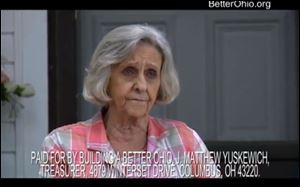
Woman appears in pro, con S.B. 5 ads
Grandmother says she's against measure, feels violated by GOP group
10/12/2011
Marlene Quinn of Cincinnati credits local firefighters for rescuing her grandson and great-granddaughter from a fire.
COLUMBUS -- Depending on which political ad you're watching, Marlene Quinn is either an opponent or a supporter of Ohio's new law restricting public-employee collective bargaining.
Dueling ads feature the Cincinnatian who credits local firefighters with rescuing her great-granddaughter, Zoey, from a fire.
Ms. Quinn originally participated in the ad financed by We Are Ohio, the organization largely fueled by labor and Democratic groups, to criticize Senate Bill 5 for taking fire-station staffing levels off the bargaining table.
But Building a Better Ohio, a largely business and Republican-backed group, lifted the footage from the ad for its own spot that says Senate Bill 5 would make Ohioans safer by preventing firefighter layoffs.
"It's insulting to the brave firefighters that saved the lives of my grandson and my great-granddaughter, Zoey,' Ms. Quinn said in a statement distributed by We Are Ohio.
"They did not ask my permission. I feel violated. I want to stop Senate Bill 5," she added.
Jason Mauk, a spokesman for Building a Better Ohio, said Ms. Quinn's story was just as effective in illustrating the need for "reasonable reforms."
"Without Issue 2, our communities will continue to lay off police officers and firefighters because they can't afford to pay them," he said. "By asking our government employees to pay their fair share of benefits and earn their paychecks based in part on performance, we can generate millions of dollars in savings that will keep safety forces on the job protecting the public."
On Nov. 8, voters will be asked to vote on Issue 2, a referendum on Senate Bill 5.
In addition to many other provisions, the law would prohibit all public employee strikes, require such workers to pay at least 15 percent of their medical-coverage premiums, and prohibit local governments from picking up any portion of an employee's share of pension contributions.
The law also takes medical benefits and many other issues off the negotiating table.
Police, firefighters, and some nurses still could negotiate for safety equipment, but staffing levels would be considered a management right no longer subject to mandatory bargaining.
Contact Jim Provance at: jprovance@theblade.com, or 614-221-0496.